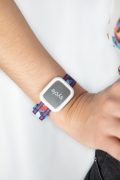Roche, Boehringer tap biosensor firms for patient studies

Roche and Boehringer Ingelheim have both formed partnerships with tech companies this week to develop and deploy wearable biosensor technology for use in clinical trials and patient monitoring.
Roche's alliance with France's Sysnav Healthcare is in the area of movement disorders, and will build on the tech company's wearable magneto-inertial sensor device for 3D movement tracking, which has already been accepted as a digital endpoint for use in Duchenne muscular dystrophy (DMD) clinical trials by the European Medicines Agency (EMA).
The partners intend to work together on the creation of industry standard digital endpoints that are suitable for monitoring disease progression, supporting clinical trials and serving as regulatory approved standards of outcome measurement, and to design the next-generation of the technology.
[caption id="attachment_106321" align="alignright" width="200"] Sysnav's Syde[/caption]
Sysnav's Syde[/caption]
SysNav has already developed two wearables based on the tech - namely its ActiMyo device for clinical trials and Syde for recording real-world data - that can track movement, but don't rely on GPS positioning and so protect patient privacy.
"Sysnav's technology offers the opportunity to measure functional disease progression to a regulatory standard across a range of diseases," said Roche's head of pharma partnering, James Sabry.
"This has the potential to improve the way patients are involved in clinical studies, the ability to determine potential treatment benefits, and enrich our understanding of disease pathophysiology," he added.
Roche is already an established player in diseases that affect movement, with therapies on the market for multiple sclerosis (Ocrevus) and spinal muscular atrophy (Evrysdi) and a pipeline of new therapies for MS, DMD, Parkinson's disease, and neuromuscular diseases.
"Bringing together Sysnav's digital health technology and Roche's expertise in neuroscience drug development and personalised healthcare will enable us to have a truly meaningful impact on patients with motor impairments," said Damien Eggenspieler, head of Sysnav's healthcare programmes.
[caption id="attachment_106324" align="alignleft" width="200"] Strados Labs' RESP[/caption]
Strados Labs' RESP[/caption]
Boehringer, meanwhile, has teamed up with US company Strados Labs to use its FDA-approved pulmonary wearable RESP biosensor in an upcoming idiopathic pulmonary fibrosis (IPF) pilot study.
Starting in the coming weeks, Boehringer will use the device to remotely monitor cough and crackles in patients at home – both symptoms that may be associated with worse outcomes in IPF. The pilot will investigate how the device can be used to monitor the status of patients, in the hope of using it in the development of new IPF therapies.
The German pharma group already has a widely-used tyrosine kinase inhibitor for IPF called Ofev (nintedanib) on the market, and is developing a PDE 4B inhibitor called BI 101550 in phase 2 trials.
"Currently, disease progression in IPF is measured by a decline in forced vital capacity (FVC)," according to Strados Labs' chief executive and cofounder, Nick Delmonico.
"We are thrilled to help Boehringer Ingelheim explore cough and crackles as an additional method to monitor disease, while allowing patients to stay in the comfort of their homes."













